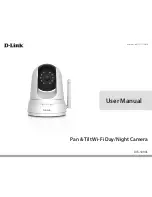
2
Safety Precautions
Before you use the digital video camera (DV camera), be
sure to read the following safety precautions, which detail
the proper operation of the DV camera and its accessories
to prevent injuries or damage to users or equipment.
This symbol indicates situations where improper use of
the digital video camera may result in harm to the
camera operator.
This symbol indicates situations where improper use
of the DV camera may result in damage to the DV
camera.
Children should not be allowed to have access to the
DV camera. They could injure themselves with inappropriate
use of the DV camera or by becoming entangled in the
carrying strap. If a child swallows a camera battery, get the
child medical attention.
Subjecting the DV camera to water or any other liquid,
or allowing condensation to form, may start a fire or give
the user an electrical shock.
• If liquid gets inside the DV camera, turn the camera
power off by removing the battery or unplugging the
power cord (with dry hands).
• Allowing the DV camera to slowly adjust to temperature
changes (as in transferring the unit from outdoors to
indoors) will help to prevent condensation. Let any
condensation evaporate before using the DV camera.
It is not advisable to leave the DV camera in a car on a
hot day for any length of time. Exposing the DV camera to
too much heat may warp the camera casing or damage the
batteries. Battery damage may result in fire, burns or
electrical shock.
Another source of possible burns is heat from the flash or
DV camera itself.
• Touching the flash after it has been used extensively can
cause burns.
• The camera body itself may burn your hands if the DV
camera has been operated for a lengthy period of time.
Do not drop batteries or let them be banged around. This
could damage the casings, causing the batteries to leak.
•
If the internal parts or components of the battery come
into contact with your eyes or your mouth, flush the
affected site with water and get medical help.
•
Do not short-circuit the battery terminals, and be sure
to cover the terminals before you throw batteries away.
If the terminals contact metal, they may overheat and
explode, causing a fire.
Black or bright (red, green, blue, and white) dots may
sometimes appear on the LCD screen. These are merely
misfiring pixels, and have no effect on the recorded image.
If you aim the DV camera at the sun, or shoot the flash
close to someone’s eyes, you may injure your eyesight or
that of someone else.
If you see smoke or smell a burning odor coming from
your DV camera, turn the DV camera off. If you continue to
operate the DV camera, it could cause a fire or give you an
electrical shock.
Do not clean the DV camera with flammable liquids, as
these may cause a fire.
Do not leave the DV camera in humid or dusty areas.
Dust and humidity can cause the DV camera to short
circuit, leading to a fire.
If the DV camera gets anywhere near a strong magnetic
field, it may not work correctly, or the pictures taken may
be ruined or adversely affected.
Use a soft, absorbent cloth to clean the surface of your
DV camera.
Summary of Contents for Take-it MV320
Page 1: ......



































